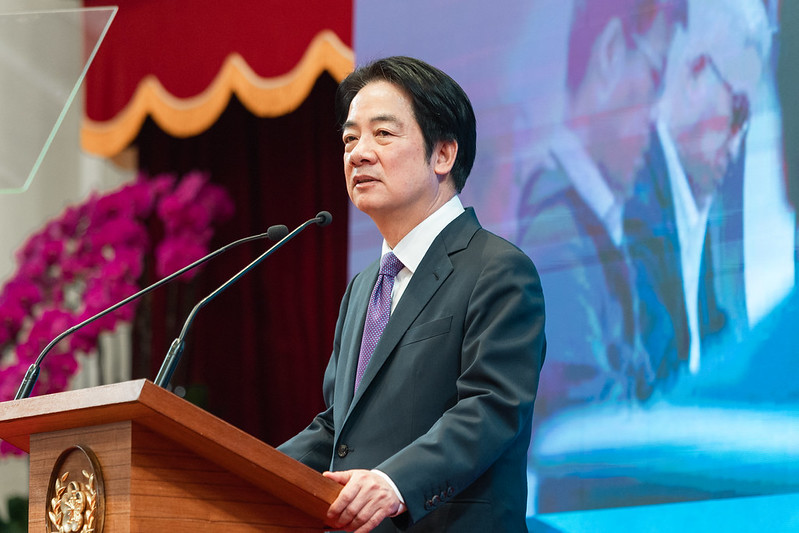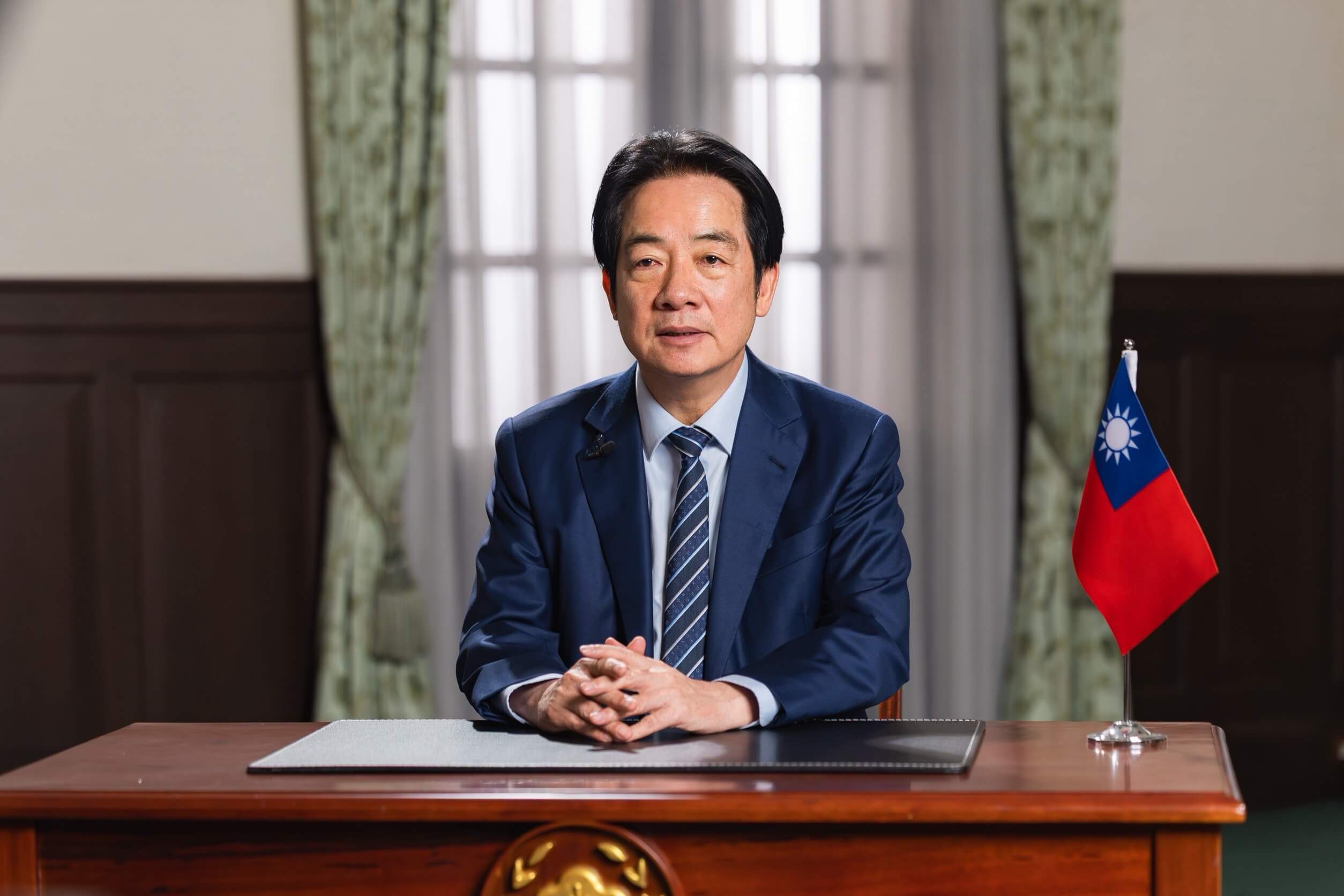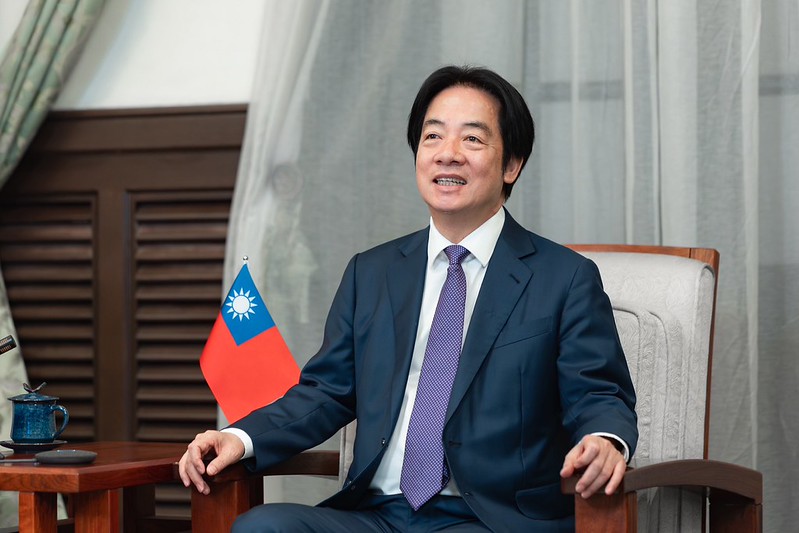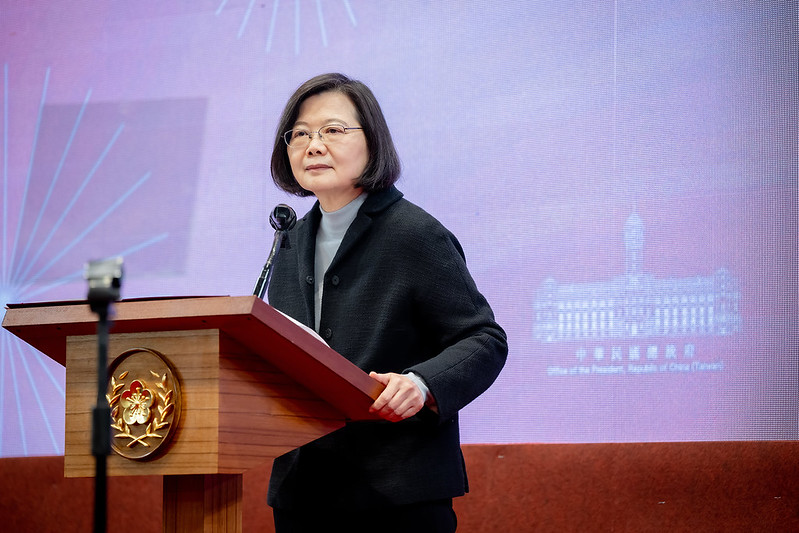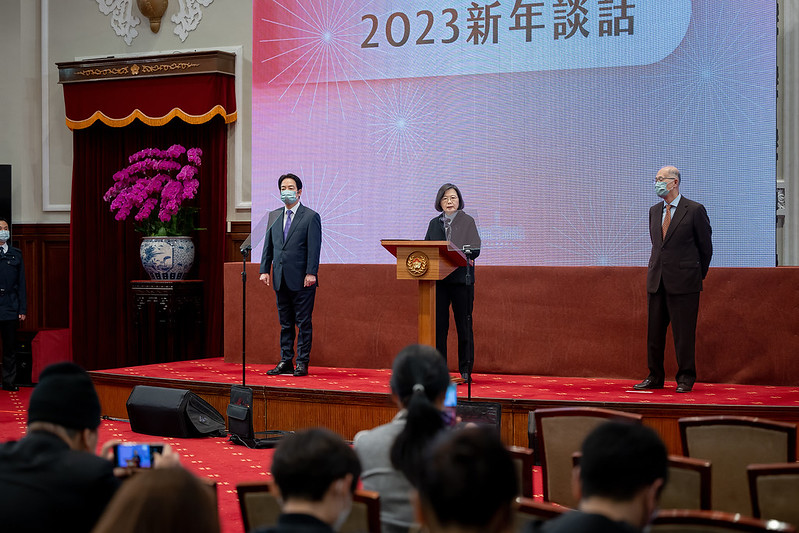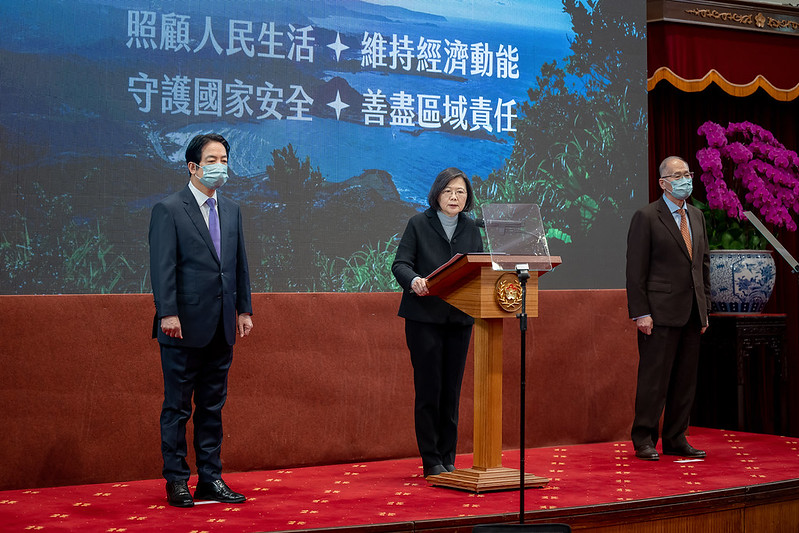News & activities
 News releases
News releases
After attending the New Year's Day flag-raising ceremony, President Tsai Ing-wen delivered her 2023 New Year's Address in the Reception Hall of the Presidential Office. President Tsai announced that the government has designated four major goals for the coming year: caring for the public welfare, maintaining our economic momentum, safeguarding our national security, and fulfilling our responsibilities toward the region. The president said that we must remain united and combine our strengths so that our nation can make further progress, become more prosperous, and enjoy greater peace and happiness.
A translation of President Tsai's remarks follows:
Today, on the first day of 2023, I want to wish everyone a happy new year.
This past year, we faced many arduous challenges together. After three years of being tested by the COVID-19 pandemic, we finally welcomed the reopening of our borders and the removal of outdoor masking regulations, marking the beginning of a new post-pandemic chapter.
Last August, China's large-scale military drills in the areas around Taiwan drew the world's attention, and our steady-handed response showed the world Taiwan's resilience and determination to defend our freedom. Despite the impacts of Russia's invasion of Ukraine, and amid a changing global political and economic landscape, the people of Taiwan made it through the past 365 days with poise.
As president, I want to thank each of my fellow citizens. Thank you for your tireless efforts, wherever you are.
Through your hard work, and our joint efforts, we overcame many obstacles together.
However, countless people still suffered because of the pandemic and global economic instability. Many caught COVID-19 and saw family members test positive, causing concern and fear. There were those who were seriously affected and even lost their lives. There were those who had to close their businesses due to strict pandemic regulations. And there were others whose livelihoods were put under heavy stress by price instability.
As the leader of our country, I take ultimate responsibility for the hardships our citizens have borne.
Although it cannot solve all our problems, government has a responsibility and a mandate to work even harder to address every shortcoming. It must be more diligent in uncovering and resolving issues, doing everything possible to care for each and every citizen.
In 2023, we must continue to be unwavering in our efforts!
Due to Russia's invasion of Ukraine, global inflation, and continued authoritarian expansion, many international organizations forecast that the global economy will continue to weaken in 2023. Countries around the world will have to contend with drastic economic and financial fluctuations as well as considerable uncertainty brought about by sporadic food and energy crises. These challenges will test economic fundamentals and capacity for growth. Taiwan will not be an exception to this.
To respond to continued inflationary pressure and the risk of an economic downturn, yesterday we held a high-level national security meeting where we outlined four major goals: to reduce the burden on our citizens, stabilize consumer prices, restructure our industry, and maintain our economic momentum.
We hope that by appropriately increasing government spending, we can ensure our citizens' quality of life and maintain our economic growth momentum in the short term, while transforming and upgrading our industrial sector to make it more competitive in the long term.
First is to reduce our citizen's burden, which comes mainly from expenses on food, clothing, housing, and transportation. To reduce spending pressure in housing, we will expand subsidies for renters and plan subsidies for mortgage-holders affected by higher interest rates.
In addition, we will step up our efforts to provide more diversified housing. Whether by constructing social housing, or accelerating reconstruction of unsafe or older buildings, we will work on the supply side to give our people more reasonable and safer housing choices.
To reduce the burden of transportation costs, our central government will oversee the provision to cross-municipality commuters of discounted monthly transit passes valid on all public transport, helping them save on their commute.
Moreover, this year we will continue to provide living subsidies for low- and mid-to-low-income households in order to improve the care and services we give to disadvantaged groups.
Our second goal is to stabilize consumer prices and thereby reduce the burden on our people. We will continue to use commodity tax reductions and to subsidize fuel and electricity prices at the source in order to stabilize consumer prices and soften the impact of price fluctuations on the lives of our citizens. At the same time, our government will closely monitor and address increases in the prices of individual goods, particularly daily goods such as eggs.
Finally, in terms of our goals of industrial restructuring and maintaining economic momentum, we are responding to declining international growth and a drop in orders. For industry, we are using subsidies and low-interest loans to help firms redesign their production lines and invest in less carbon intensive and smarter equipment and software. We are also helping our small- and medium-sized enterprises and factories make progress toward greater legal compliance, sustainability, and efficiency in their operations, which will promote industrial upgrading and transformation while also helping increase orders in our domestic machinery sector.
In international tourism, as the post-pandemic global travel sector gradually recovers, we have set a goal of reaching 6 million tourist visits in 2023. We are offering incentives, subsidies, and other measures to help our travel industry attract international travelers and foreign firms encourage their employees to come to Taiwan to travel, study, and book cruises and charter flights. In this way, we are creating opportunities for the export of services and making up for the decline in the export of goods.
To spur domestic demand and investment through public construction, and address the impacts of extreme weather events, we must expand investment in infrastructure projects by our agricultural agencies and complete them ahead of schedule. We will improve and accelerate the construction on environmental infrastructure for agriculture. We will also expand our Green Environmental Payment Program as well as agricultural insurance and occupational injury coverage for farmers, and increase related coverage and payouts.
Not only do we want to better protect the lives of our 1 million farmers, we also want to spur the development of Taiwan's agricultural sector, enhancing its competitiveness, creating new international export markets, improving its adaptability to the effects of climate change on production, and ensuring domestic food security.
In addition to these programs to respond to the economic situation over the coming year, the Presidential Office and Executive Yuan will jointly conduct a review of the Six Core Strategic Industries which are key to long-term national development, and will hold consultations with private sector enterprises and industry and trade associations invited to participate.
The government welcomes our industries, including semiconductor, information and communications technology (ICT), green energy, infrastructure, and national defense industries, to collaborate and provide suggestions and strategies on how to further consolidate Taiwan's key position in global supply chains while maintaining our industrial development momentum and the security and stability of our energy supply.
The semiconductor industry has already submitted a position paper for the president's consideration. Our government agencies are currently analyzing these policy issues, and we will hold further consultations soon.
I would like to take this opportunity to report that, according to Ministry of Finance projections, national tax revenue in 2022 is expected to exceed budgeted expenditures by NT$450 billion. Of this surplus, NT$380 billion will go to the central government after a NT$70 billion distribution to local governments.
We plan to use this central government budget surplus in three ways. First, we will budget an additional NT$100 billion on top of existing allocations in order to cut deficits in our labor and health insurance funds and to subsidize electricity prices through investment in Taiwan Power Company (Taipower).
And to respond to changes in the economic landscape, we plan to put an initial NT$100 billion toward the subsidy programs I mentioned above to cover their initial financing requirements.
Third, we will reserve certain financial resources for possible future needs, and will, as our budget allows and as circumstances require, consider other programs to benefit the public welfare.
I know some have recently argued that we should try to make everyone happy by dividing these funds up equally among the public. But given the high degree of global economic uncertainty at this moment, and to maintain our nation's resilience in responding to a potential crisis, our government's responsibility is to plan ahead and prioritize the use of our valuable resources to assist our more vulnerable citizens and industries.
This was not an easy decision, but it is necessary for the good of the nation. I want to ask my fellow citizens for their understanding and support.
In addition to economic and industrial challenges, the continued expansion of authoritarianism has aroused insecurity over the prosperity and stability of the Indo-Pacific region.
This past Tuesday, I announced a military force realignment plan which I hope will strengthen our defense capabilities through the review and realignment of our military force structure, and by making qualitative and quantitative improvements to training for conscripts engaged in mandatory military service.
Protecting our homeland is not just the duty of our armed forces; it is a joint responsibility that should be shouldered by every single citizen. Over the past few days, there has been a lot of discussion regarding the plan to adjust mandatory military service requirements, and people from across our society have made a lot of suggestions. We will take these into consideration in order to further fine-tune this plan.
I also want to ask everyone to please continue supporting our armed forces and our national defense. Let's work together to protect our homeland and defend freedom and democracy.
I also want to remind the authorities in Beijing that all stakeholders in this region bear a shared responsibility for peace and stability in the Taiwan Strait. Indeed, peace and stability is what we all hope for.
From the pandemic to international political and economic upheaval, we on the two sides of the Taiwan Strait are facing many of the same challenges. But war has never been a way to solve problems, and only through dialogue, cooperation, and joint efforts toward the goals of regional stability and development, can we help more people enjoy security and happiness.
We are aware that the pandemic situation has recently become more serious in China. If need be, we are willing, out of humanitarian concern, to provide necessary assistance to help more people get through the pandemic and enjoy good health and peace of mind in the new year.
As the pandemic situation has continued to grow worse in China, many countries have adopted more rigorous measures to prevent the spread of COVID-19. Based on the latest conditions, and in line with guidelines provided by experts, we have adopted pandemic control measures that will remain in place from today through January 31 in order to ensure the health of our citizens.
As the global pandemic keeps changing, we will track the situation closely and continue to adjust our pandemic response. At the same time, we ask everyone to get the next-generation vaccine so that we can improve the immunity of our general population and protect one another's health.
The theme of our 2023 New Year's Day celebration is "Together We Can." Over the coming year, our government's four key missions will be caring for the well-being of the public, maintaining economic momentum, safeguarding our national security, and fulfilling our responsibilities toward the region. We must also remain united and combine our strengths so that our nation can make further progress, become more prosperous, and enjoy greater peace and happiness.
Once again, I wish all my fellow citizens a happy new year. Thank you!
After her remarks, President Tsai took questions from the media.
Asked whether the government plans to issue consumption vouchers or direct cash payments to citizens, and about the specifics of the government's budget plan, President Tsai said that the NT$380 billion surplus in tax revenues available to the central government will be allocated along three different lines and in four different packages. The first package will use NT$100 billion to cut deficits in our labor and health insurance funds while also expanding electricity price subsidies. The president said that reducing financial pressure on our labor and health insurance systems and stabilizing commodity prices at the source is also one way of putting tax dollars back into the hands of the people.
President Tsai pointed out that the second package will use NT$100 billion to initiate the first in a series of programs for strengthening our economic resilience. She explained that these programs will help lighten the burdens of our people in terms of their expenses on food, clothing, housing, and transportation, and will also assist those in our traditional industries, agriculture, fisheries, tourism, and other industries that urgently need help.
The president stated that because the global economic landscape this year is set to be more challenging than expected, with a very high degree of uncertainty, the third package will consist of the remaining NT$180 billion, and may involve a second and third wave of response measures, which we will plan as needed to prepare for possible future contingencies.
The president further explained that, if resources and our budget allow, there will be a fourth package, as part of which we will consider other programs to have this tax revenue benefit public welfare. Saying that the high-level national security meeting on the previous day did not specifically address the distribution of consumption vouchers or direct cash payments, the president clarified that there is no specific timeframe for reviewing these issues, and that further discussions would be held depending on overall economic developments, with money to be spent where it is most needed and appropriate.
Asked what she found most memorable about 2022, and what her views were on the review by the Democratic Progressive Party (DPP) of its performance in the recent local elections, President Tsai said that the pandemic was the part of the year she would find most difficult to forget. In regard to the DPP post-election review, the president stated that she is taking responsibility for both party and political affairs, having resigned her position as DPP chair and having conducted a review of related political affairs. The president said that going forward, she will respond to the review's points through individual policy adjustments. She added that her speech lays out what she wants to accomplish in 2023 and said she will give her utmost to accomplish each item mentioned.
President Tsai was asked what challenges are presented by the current cross-strait situation, and what her opinion is on Chinese President Xi Jinping's statement in his own New Year's message that "The people on both sides of the Taiwan Strait are members of one and the same family. I sincerely hope that our compatriots on both sides of the Strait will work together." Saying that she had noticed President Xi's softer tone in this speech, President Tsai issued a reminder that the activities of the People's Liberation Army in the areas around Taiwan are of no help to cross-strait relations or to regional peace and stability. The president stated that Taiwan and China's shared challenges in 2023 include the post-pandemic resumption of healthy and orderly cross-strait people-to-people exchanges, the need to respond to a variety of economic changes caused by the global economic downturn, and our shared duty to maintain peace and stability in the Taiwan Strait and the broader region, all of which are responsibilities that the two sides of the strait must jointly address.
Asked about a potential cabinet reshuffle and candidates for future cabinet roles, President Tsai stated that she will report any changes to cabinet personnel once confirmed, and asked the media not to engage in excessive speculation. The president said that stable governance is our goal, and that we also want to break new ground in this regard.
Asked whether cross-strait discourse has shifted from the previously used slogan of "resisting China and protecting Taiwan" to "peacefully defending Taiwan" in light of her statement that everyone hopes for peace across the Taiwan Strait and in light of Vice President Lai's expression of the need to "peacefully defend Taiwan," President Tsai said that no matter the wording, they share the same goal of maintaining peace and stability across the Taiwan Strait. The president further emphasized that to defend Taiwan, we must also continue to comprehensively strengthen our readiness to ensure we are fully capable of safeguarding Taiwan.

